
IDEA
- 3 Transnational project meetings
- 1 JSTE aimed at:
a) providing comprehensive joint learning and exchange between the participants on tools and methodologies to foster Circular Economy and sustainability through art, craft and NFE methodologies
b) testing the Training Format produced in R1
c) lay the foundation for the co-creation of the activities to be included in the R2 and tested in the local phase
- Local workshops involving participants in the C1 as trainers and unemployed adults, to test the activities to be included in the R2 and lay the foundation for the co-creation of the video-tutorials to be included in R3.
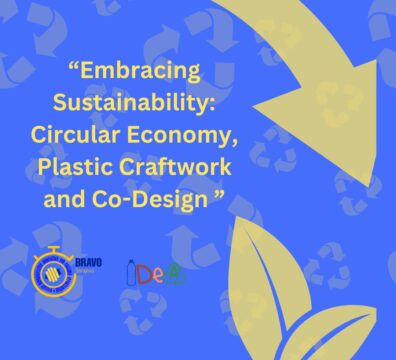
“Embracing Sustainability: Circular Economy, Plastic Craftwork, and Co-Design in Bosnia, Poland, and North Macedonia”
As global environmental challenges intensify, Bosnia, Poland, and North Macedonia are uniting to champion sustainability through the principles of the circular economy, plastic craftwork, and co-design. This collaborative project aims to foster eco-friendly innovation and community empowerment by drawing inspiration from successful initiatives in other countries, such as Tunisia’s vibrant second-hand clothing industry. Building on each country’s unique strengths and perspectives, this partnership aims to create a model of sustainable development that can be replicated elsewhere.
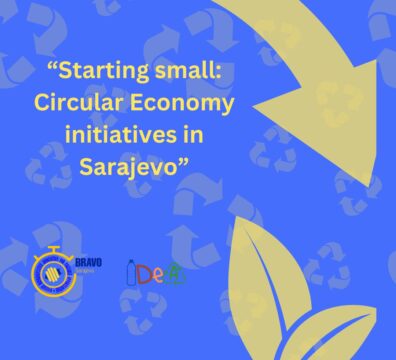
“Starting Small: Circular Economy Initiatives in Sarajevo”
In 2020, Bosnia and Herzegovina (BiH) formalized its commitment to the circular economy by adopting the Green Agenda for the Western Balkans, a roadmap aligned with the European Green Deal to achieve climate neutrality and environmental sustainability. According to the European Parliament, circular economy refers to the practice of “sharing, leasing, reusing, repairing, refurbishing and recycling existing materials and products as long as possible.”
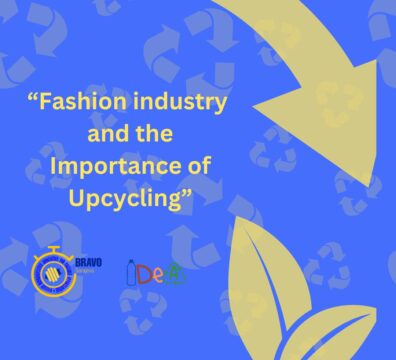
“Fashion industry and the Importance of Upcycling”
Upcycling is the transformative process of turning waste materials, unwanted products, or by-products into new, higher-value items. Unlike traditional recycling, which often involves breaking down materials into their basic components for the creation of new products, the term “upcycling” was coined in 1994 by German engineer Reiner Pliz who explains in the British monthly magazine “Salvo,” “I call recycling down-cycling. What we need is up-cycling, thanks to which old products are given a higher, not a lower, value.”
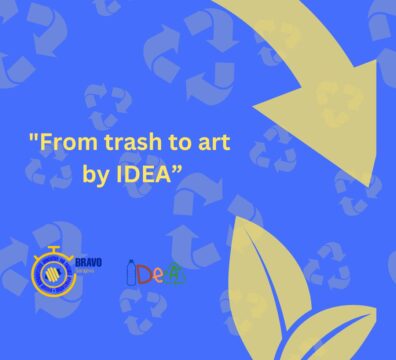
“From trash to art by IDEA”
In an effort to mitigate the adverse effects of the global overproduction and overconsumption of manufactured products, more and more local initiatives of sustainability and circular economy are emerging. Such endeavors are also meant to foster a better social inclusion of individuals engaging in these enterprises. In the broad context of the present-day environmental crisis, art can be used as a means to draw attention towards the risks of depleting our resources of raw materials in an unsustainable way.
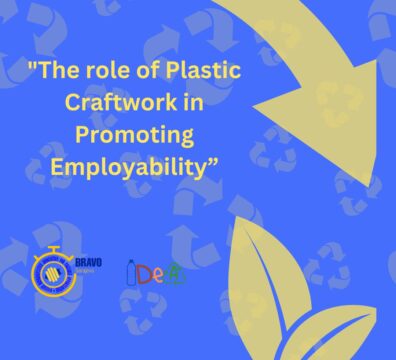
“The Role of Plastic Craftwork in Promoting Employability and Sustainability”
Plastic craftwork is more than a creative activity; it is a powerful tool for promoting sustainability and enhancing employability among adults. By turning plastic waste into useful and beautiful items, individuals can develop valuable skills, raise environmental awareness, and foster social inclusion.
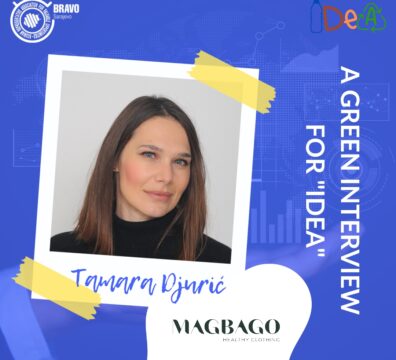
Tamara Djurić’s Story for IDEA
Zovem se Tamara Djurić i osnivačica sam inovativnog modnog startupa Magbago. Diplomirana sam ekonomistica, ali iz ljubavi prema dizajnu bavim se modom. Živim u Bijeljini, a rođena sam u Tuzli u aprilu 1986. godine. Magbago je nastao iz ljubavi prema modi, ali i iz moje zdravstvene potrebe. Kao osoba koja pati od atopijskog dermatitisa i čestih epizoda ekcema, trebala sam pronaći način da ublažim svoje simptome jer su mi uobičajene tkanine pogoršavale stanje.
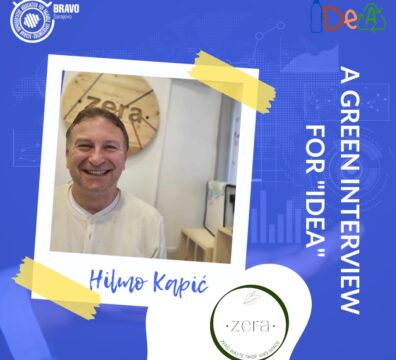
Hilmo Kapić’s Story for IDEA
My name is Hilmo Kapić. After spending almost 30 years in America, I returned to Bosnia and Herzegovina (BiH) last summer. I believe I was raised to respect nature and value our natural resources, which has fueled my interest in better resource management. In America, where I spent most of my life, there is good infrastructure for household waste management and the like, and I developed good habits there (from waste separation onward).
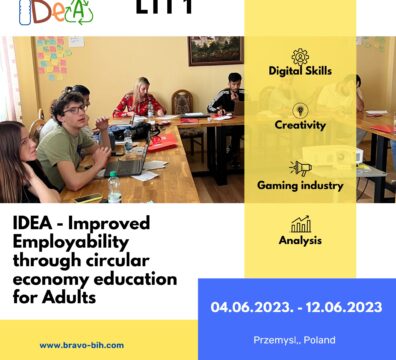
LTT in Przemysl, Poland for the project IDEA
This time an LTT was held in Poland for the IDEA project from the 5th of June to the 12th of June. The participants started their first day with an introduction and representing themselves to others. They discussed how the training will go on for the next few days and about other technical concerns.
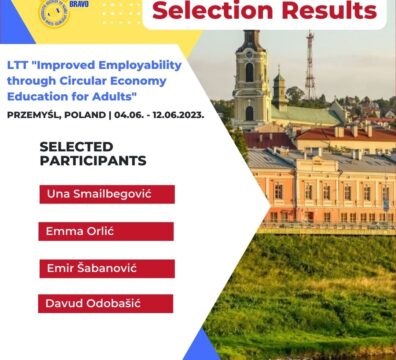
SELECTION RESULTS FOR LTT COURSE “IDEA” IN PRZEMYSL, POLAND
Improved Employability through Circular Economy Education for Adults” (IDEA) is a 24 months Cooperation partnership aimed at promoting Circular Economy and Sustainability among unemployed adults, by fostering a greater interaction between the European Green Deal and the EU Gender Equality Strategy 2020-2025
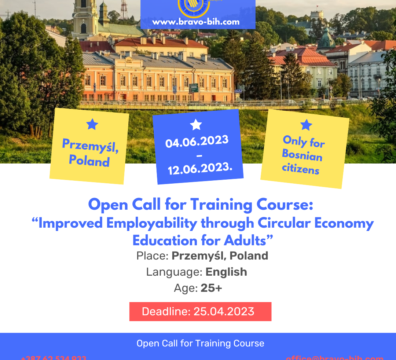
OPEN CALL FOR LTT COURSE “IDEA” IN PRZEMYSL, POLAND
This project is supported and co-funded by the Erasmus+ programme. It means that your travel costs, accommodation, and food will be fully covered if you get selected for the project. The European Commission’s support for the production of this publication does not constitute an endorsement of the contents, which reflect the views only of the authors
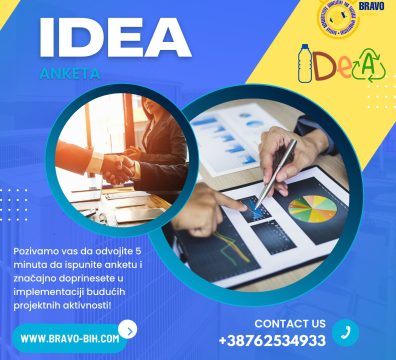
Anketa u sklopu IDEA – Erasmus+ projekta
Imate više od 45 godidna i nezaposlena ste osoba? Smatrate da je došlo vrijeme za promjene? S novim projektima BRAVO

“Improved Employability through circular economy education for Adults” (IDEA)”
“Improved Employability through circular economy education for Adults” (IDEA) is a 24 months Cooperation partnership aimed at promoting Circular Economy and Sustainability among unemployed adults, by fostering greater interaction between the European Green Deal and the EU Gender Equality Strategy 2020-2025.
